SAF™ 3207 HD is a hyper-duplex (austenitic-ferritic) stainless steel for service in highly corrosive conditions where also high mechanical strength is necessary. This makes the grade ideal for applications such as deepwater umbilicals. SAF™ 3207 HD is characterized by:
- Excellent resistance to pitting and crevice corrosion
- Excellent resistance to stress corrosion cracking (SCC) in hydrogen sulphide (H2S) and chloride containing environments
- High resistance to general corrosion in acidic and caustic environments
- Excellent resistance to erosion corrosion
- Excellent corrosion fatigue properties
- Exceptionally high mechanical strength
- Exceptionally high fatigue strength
- Physical properties that offer design advantages
- Good weldability
Standards
- UNS: S33207
Product standards
Seamless tube and pipe: ASTM A789; A790
Chemical composition (nominal)
| C | Si | Mn | P | S | Cr | Ni | Mo |
|---|---|---|---|---|---|---|---|
| ≤0.030 | ≤0.8 | ≤1.5 | ≤0.035 | ≤0.010 | 32 | 7 | 3.5 |
Others
N=0.5
Applications
SAF™ 3207 HD hyper-duplex steel has been developed for deepwater umbilicals; an application with extreme requirements on pitting and crevice corrosion resistance, mechanical strength and fatigue properties.
Offering greater yield strength, greater corrosion resistance and superior fatigue properties compared with super-duplex steels, SAF™ 3207 HD hyper-duplex steel is also an excellent material choice for a range of other oil and gas applications. For example, when resistance to hydrogen sulfide (H2S) is a requirement, such as in raw seawater injection, control lines and chemical injection lines, SAF™ 3207 HD offers high reliability and operational safety leading to lower operating costs.
Corrosion resistance
General corrosion
SAF™ 3207 HD is highly resistant to corrosion by organic acids, e.g. formic acid and acetic acid, see Figure 4.
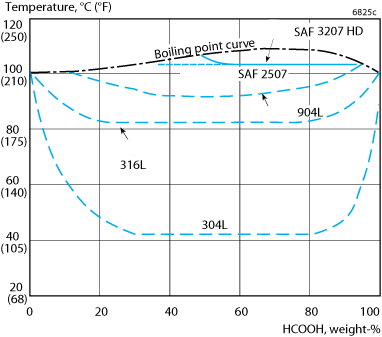
Resistance to inorganic acids is comparable to, or even better than that of high alloy austenitic stainless steels in certain concentration ranges. Figures 5 and 6 show isocorrosion diagrams for sulfuric acid and hydrochloric acid, respectively.
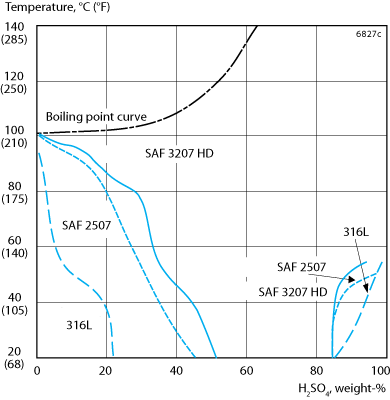
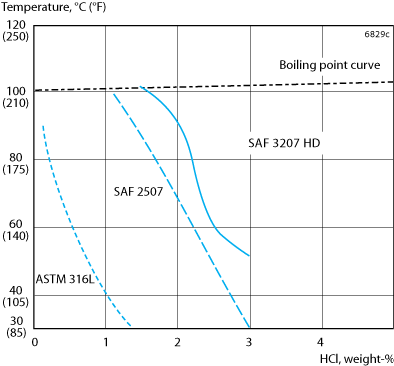
Pitting and crevice corrosion
The pitting and crevice corrosion resistance of stainless steel is primarily determined by the content of chromium, molybdenum and nitrogen. The manufacturing and fabrication practice, e.g. welding, are also of vital importance for the actual performance in service. A parameter for comparing the resistance to pitting in chloride environments is the PRE number (Pitting Resistance Equivalent).
The PRE is defined as, in weight-%
PRE = %Cr + 3.3 x %Mo + 16 x %N
The minimum PRE-value for SAF 3207 HD is 50.
One of the most severe pitting corrosion tests, applied to stainless steels, is ASTM G48 i.e. exposure to 6% FeCl3. In a modified version of the ASTM G48A test, the sample is exposed for periods of 24 hours. When pits are detected, together with a substantial weight loss (> 5 mg), the test is interrupted. Otherwise, the temperature is increased by 5°C (9°F) and the test continued with the same sample.
The crevice corrosion test was performed in 6% FeCl3, with a crevice specified in the MTI-2 procedure, where an artificial crevice is mounted on the sample with a torque of 0.28 Nm. The values obtained and comparisons with SAF™ 2507 are given in Figure 7. SAF 3207 HD™ performs better than SAF™ 2507.
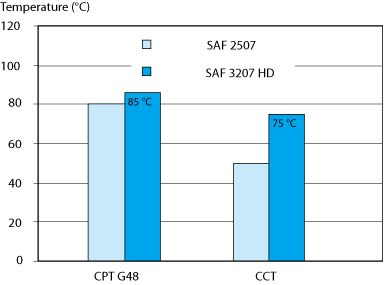
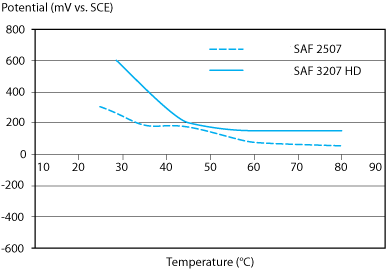
Fabrication
Machining
Being a dual phase material (austenitic-ferritic), SAF™ 3207 HD will present a different tool wear profile from that of austenitic stainless steels.
The cutting data (speed and feed) must, therefore, be lower than that recommended for austenitic grades.
Forms of supply
Seamless tube
Seamless tubes in SAF™ 3207 HD can be supplied in typical umbilical tube dimensions. The delivery condition is either solution annealed and either white pickled or polished.
Heat treatment
The tubes are normally delivered in heat treated condition. If additional heat treatment is needed due to further processing the following is recommended.
Solution annealing
1040-1140°C (1905-2085°F), rapid cooling in air, protective atmosphere or water.
Mechanical properties
At 20°C (68°F)
| Wall thickness | Proof strength | Tensile strength | Elong. | Hardness | |
|---|---|---|---|---|---|
| Rp0.2a | Rm | Ab | A2" | HRC | |
| mm | MPa | MPa | % | % | |
| <4 | ≥770 | ≥950 | ≥25 | ≥15 | ≤36 |
| >4 | ≥700 | ≥850 | ≥25 | ≥15 | ≤36 |
| Wall thickness | Proof strength | Tensile strength | Elong. | Hardness | |
|---|---|---|---|---|---|
| Rp0.2a | Rm | Ab | A2" | HRC | |
| in | ksi | ksi | % | % | |
| <0.157 | ≥112 | ≥138 | ≥25 | ≥15 | ≤36 |
| >0.157 | ≥101 | ≥123 | ≥25 | ≥15 | ≤36 |
1 MPa = 1 N/mm2
a) Rp0.2 and Rp1.0 correspond to 0.2% offset and 1.0% offset yield strength, respectively.
b) Based on L0 = 5.65 √S0 where L0 is the original gauge length and S0 the original cross-section area.
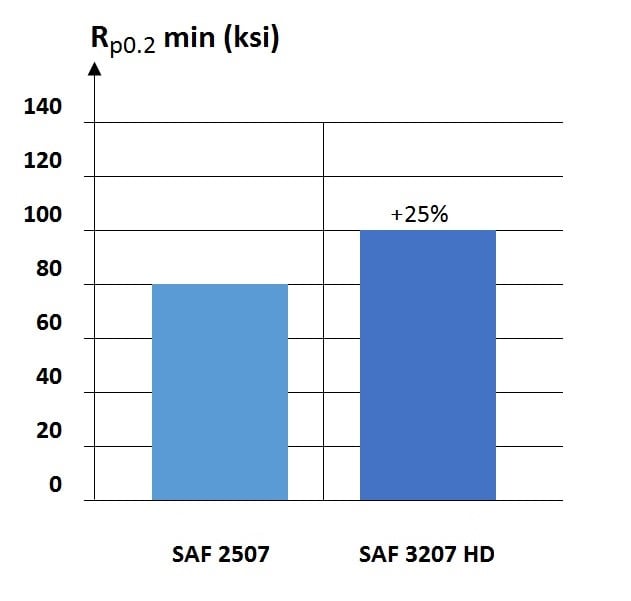
At high temperatures
If SAF™ 3207 HD is exposed to temperatures exceeding 250 °C (480 °F), for prolonged periods, the microstructure changes, which results in a reduction in impact strength. This does not necessarily affect the behavior of the material at the operating temperature. Please contact Alleima for more information.
| Temperature | Proof strength | Tensile strength |
|---|---|---|
| Rp0.2a | Rm | |
| °C | MPa | MPa |
| min. | min. | |
| 50 | 696 | 923 |
| 100 | 657 | 850 |
| 150 | 609 | 811 |
| 200 | 585 | 784 |
| 250 | 582 | 785 |
| 300 | 572 | 791 |
| Temperature | Proof strength | Tensile strength |
|---|---|---|
| Rp0.2a | Rm | |
| °F | ksi | ksi |
| min. | min. | |
| 120 | 101 | 134 |
| 200 | 96 | 124 |
| 300 | 89 | 118 |
| 400 | 85 | 114 |
| 500 | 84 | 114 |
| 600 | 83 | 115 |
Fatigue strength
 Figure2: S-N curves for Sandvik SAF 3207 HD, SAF 2507 and DNV design curves
Figure2: S-N curves for Sandvik SAF 3207 HD, SAF 2507 and DNV design curves
Impact strength
SAF™ 3207 HD possesses good impact strength. The ductile-brittle transition temperature is below -50°C (-58°F). Figure 3 shows the impact strength for SAF™ 3207 HD.
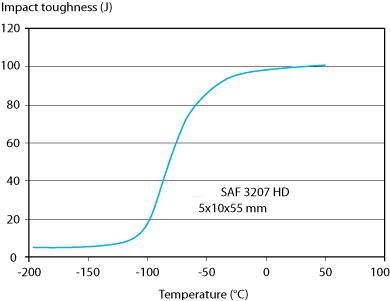
Physical properties
Density: 7.7 g/cm3, 0.28 lb/in3
| Temperature, °C | µΩm | Temperature, °F | µΩin. |
|---|---|---|---|
| 20 | 0.87 | 68 | 34.1 |
Specific heat capacity
| Metric units | Imperial units | ||
| Temperature, °C | J/(Kg °C) | Temperature, °F | Btu/(lb °F) |
|---|---|---|---|
| 20 | 480 | 68 | 0.12 |
| 100 | 510 | 200 | 0.12 |
| 200 | 540 | 400 | 0.13 |
| 300 | 570 | 600 | 0.13 |
| 400 | 590 | 800 | 0.14 |
Thermal conductivity
| Temperature, °C | 20 | 100 | 200 | 300 | 400 |
|---|---|---|---|---|---|
| SAF™ 3207 HD | 13 | 15 | 16 | 18 | 20 |
| SAF™ 2507 | 14 | 15 | 16 | 18 | 20 |
| AISI 316L | 14 | 15 | 17 | 18 | 20 |
| Temperature, °F | 68 | 200 | 400 | 600 | 800 |
|---|---|---|---|---|---|
| SAF™ 3207 HD | 7 | 9 | 9 | 10 | 20 |
| SAF™ 2507 | 8 | 9 | 9 | 10 | 12 |
| ASTM 316L | 8 | 9 | 10 | 10 | 12 |
Thermal expansion
SAF™ 3207 HD has a coefficient of thermal expansion close to that of carbon steel. This gives SAF™ 3207 HD definite design advantages over austenitic stainless steels in equipment comprising of both carbon steel and stainless steel. The values given below are average values in the temperature ranges.
| Temperature, °C | 30-100 | 30-200 | 30-300 | 30-400 |
|---|---|---|---|---|
| SAF™ 3207 HD | 13.5 | 13.5 | 14.0 | 14.5 |
| SAF™ 2507 | 13.5 | 14.0 | 14.0 | 14.5 |
| Carbon Steel | 12.5 | 13.0 | 13.5 | 14.0 |
| ASTM 316L | 16.5 | 17.0 | 17.5 | 18 |
| Temperature, °F | 86-200 | 86-400 | 86-600 | 86-800 |
|---|---|---|---|---|
| SAF™ 3207 HD | 7.5 | 7.0 | 8.0 | 8.0 |
| SAF™ 2507 | 7.5 | 7.5 | 8.0 | 8.0 |
| Carbon Steel | 6.8 | 7.0 | 7.5 | 7.8 |
| ASTM 316L | 9.0 | 9.5 | 10.0 | 10.0 |
Modulus of elasticity, (x103)
| Temperature, °C | MPa | Temperature, °F | ksi |
|---|---|---|---|
| 20 | 200 | 68 | 29.0 |
Welding
The weldability of SAF™ 3207 HD is good. Welding must be carried out without preheating and subsequent heat treatment is normally not necessary. A suitable method of fusion welding is gas tungsten arc welding GTAW/TIG with shielding gas of Ar+2% N2. For tube to tubesheet welding, it is recommended to use Ar+3% N2 as shielding gas to have proper weld metal structure.
For SAF™ 3207 HD, heat input of 0.2-1.0 kJ/mm and interpass temperature of <100°C (210°F) are recommended.
Recommended filler metals
GTAW/TIG welding
Exaton 27.7.5.L. For information on filler metal and welding method, please contact Alleima.
Disclaimer: Recommendations are for guidance only, and the suitability of a material for a specific application can be confirmed only when we know the actual service conditions. Continuous development may necessitate changes in technical data without notice. This datasheet is only valid for Alleima materials.